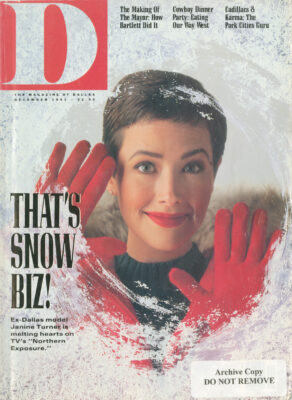Amonth or so before the November city elections, I received a letter from a man who said he had been in Dallas on business and had seen billboards for a certain City Council candidate. Striking a note of high moral outrage, the writer accused the candidate of being involved in a “scandal” while in college more than a decade ago.
Half-expecting a hoax, I called the candidate, who to my surprise admitted that it was all true. As an officer in a campus organization, he had charged persona), longdistance calls to the group and, while running for another campus office, had used the organization’s money to pay for his campaign advertising. The total cost of the infraction was less than $1,000, he said. After a judicial proceeding, he was voted out of office. In language we’ve grown used to hearing, he chalked it up to youthful indiscretion. Paid the price. Learned the lessons.
So what to do with the letter? More than likely, this was yet another case of a politician planting a negative story about a rival, hoping the press would do the dirty work for him. Why get manipulated? On the other hand, unlike many of these stories, this one happened to be true. I had the facts and had heard both sides of the story. So why not print it?
An old journalistic maxim says when in doubt, run what you have and let the public decide what to do with it. There’s merit in that argument, but invoking the public’s “right to know” can also provide a cop-out when journalists don’t want to exercise judgment. All media people hear dozens of things that, for one reason or another, don’t make the news. Journalists can’t argue that, well, we revealed scandal X because, see, we reveal everything we learn. We don’t. We choose, we judge.
So I had to judge, and thus found myself in a little corner of the big question- sadly, perhaps the only question-of fin de siecle American politics: character. Who, if anyone, is good enough to lead?
That’s what the unreal Clarence Thomas-Anita Hill confrontation was all about. The character question. Private self vs. public self. If you’re smart, hard-working and effective, but you’ve got some skeletons rattling in the closet of your private/marital/ sexual life, should you be barred from public office? Unless we can decide on a sane standard, we’re going to have to recruit our candidates (after thorough background checks and hymeneal examinations) from the Sacred Sisters of St. Mary’s Convent.
But there’s a corollary to the question of who is good enough to lead. Who is good enough to judge? Looming over the whole weird weekend was Sen. Edward Kennedy, who as fate and seniority would have it sat dead center in the camera’s eye as the Senate Judiciary Committee tried to decide whose story smelled worse, Thomas’ or Hill’s. All over the country, talk show cowboys went into orgasm chortling at Teddy. What about Mary Jo Kopechne? This boozy chaser of jiggly blonds half his age is gonna judge somebody?
And the answer, I’m afraid, is yes. He is. Or if not him, someone else who may have erred in other, less public ways. You, perhaps, or me. Right now the sexual peccadilloes are all the rage, but our flaws may be less in vogue. And how do you establish degrees of imperfection? That gets us into the crazy moral calculus that now passes for political thought: Is plagiarism 20 years ago worse than a big bounced check three years ago? Is adultery better than belonging to a segregated club? What if you were under 25 when you “experimented” with marijuana or group sex or misappropriation of funds? Under 20? When does the statute of limitations run out?
Kennedy, who has squandered more precious moral authority than most politicians can ever attain, is a perfect symbol for our dilemma, which may as well be called the Teddy Question: How do you balance a useful, productive public life with a soiled, chaotic private life? At what point does the latter spill over and stain the former? The rule of thumb we journalists erratically follow seems to be this: If we think the pol’s private life is affecting-or worse, contradicting-his public life, we run the story. Nobody elected the press, but here we are, making the judgments that may keep someone from getting elected.
And in this case, 1 decided to sit on the letter. My reasoning wouldn’t make a very good Supreme Court opinion. This college misdeed just didn’t seem important enough to bring up after all this time. Again the calculus. Rape would be bad enough. . .or robbery.. .And somewhere in there I forgot to think as a journalist and found myself wondering whether I was good enough to judge this person. How good is good enough? Better than Roy Tarpley? Walker Railey? Ted Kennedy?
It’s great fun to bash those boozy, hypocritical politicians, but imagine that you plan to run for office next week. Imagine that, thanks to some ultimate Orwellian background check, every hidden tact of your life starting with childhood will be known by the electorate the moment you announce. You will have no secrets. Could you get elected? Could any of us?
Still, we can’t run a society without judgment. When I hear of abused children burned with cigarettes, scalded with hot water, I want their tormentors caged or killed. Of course these monsters did not make themselves. Someone, something set them on their road. But at some point we must quit dumping the blame back down the genetic trail and say, enough, stop, you’re guilty and you must pay. Those who judge may not be much better in some ways-but at least they have not done this, so pick a jury and let’s go. Rough justice, but it’s the only kind we have.
Immanuel Kant said, “Out of the crooked timber of humanity, no straight thing was ever made.” True words, on which Baptists and evolutionists, St. Paul and St. Darwin, can agree. There’s a warp in the wood, whether put there by the Lord or the killer ape. So we judge. Must judge. But we should do it as we fight a war, even a just war: without glee or gloating, more in sorrow than in anger, and certain as we cast our stones that others, no more or less perfect, are ready to fling their own at us.
Related Articles

D Home Events
Scenes from the D Home Spring Issue Party 2024
The interiors community gathered at the Dallas Market Center on April 3 for the D Home Spring Issue Party.
By D Home

Arts & Entertainment
In Denton, New Life for an Old Theater
The entrepreneurs who brought the Texas Theatre back to life in Oak Cliff see a similar future for the Fine Arts in downtown Denton. So does its City Council.
By Austin Zook

Golf
A New Way to Golf
The game has exploded out of the buttoned-up confines of the country club to become more popular than ever—driven by North Texas’ courses, clubs, innovators, and influencers.


